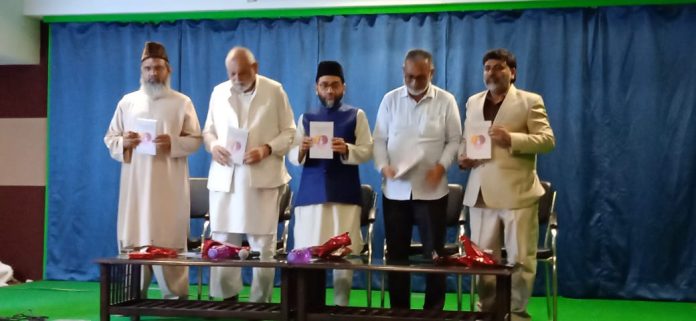New Delhi: A groundbreaking Urdu book titled “LGBTQIA+ aur Islam” by noted biologist and genetics expert Dr. Mohammad Rizwan was launched at the headquarters of Jamaat-e-Islami Hind (JIH) in New Delhi. Published by Markazi Maktaba Islami Publishers, the 286-page volume provides a critical Islamic, psychological, and sociological perspective on queer theory and non-traditional sexual orientations.
Presiding over the launch, JIH President Syed Sadatullah Husaini hailed the book as a timely and scholarly response to the aggressive global promotion of LGBTQIA+ ideology. He was joined by former Delhi Minorities Commission Chairman Dr. Zafarul Islam Khan, JIH Vice Presidents S. Ameenul Hasan and Prof. Salim Engineer, among others.
A Scholarly Response to a Civilizational Challenge
In his address, Mr. Husaini commended Dr. Rizwan for offering a comprehensive, multidisciplinary critique of queer ideology, which he termed a “civilizational threat” rather than just a matter of individual behavior. He warned of the Western institutionalization of gender-fluid ideologies, citing examples of school forms listing over a dozen gender identities and legal repercussions for dissent.
“The normalization of such concepts is not just ideological—it is enforced,” he said, expressing concern about similar trends gradually taking root in India. He stressed that Islam upholds the family as the foundational unit of society and warned that unrestricted sexual freedoms jeopardize not only moral values but human civilization itself.
Rights Must Align with Social Ethics, Not Personal Desires
Mr. Husaini emphasized the importance of placing social responsibility above individual hedonism, a core distinction between Islamic and Western civilizations. “Rights are not absolute,” he explained, drawing parallels between visa restrictions for national security and limits on sexual freedom to safeguard family and societal order.
He underscored that Islam does not target LGBTQ individuals specifically but places boundaries on all sexual behavior—including within heterosexual marriages—to protect the sanctity of family life.
Homosexuality Framed as a Modern Western Construct
Dr. Zafarul Islam Khan, echoing the book’s themes, framed homosexuality as a Western ideological import, tracing its normalization to post-French Revolution concepts of absolute personal freedom. He noted that much of the non-Western world—including Africa and Russia—continues to resist LGBTQ acceptance. He also warned of active attempts to push LGBTQ narratives in India via legal and public platforms, including Pride marches.
Dr. Khan pointed out that significant segments in the West also oppose LGBTQ ideology, highlighting that figures like Donald Trump gained support for opposing such views.
Book Critiques Queer Theory and Modern Sexual Narratives
Dr. Rizwan, who also heads the Centre for Study and Research (CSR), explained that his book dissects how post-1950s queer theory challenges traditional gender binaries and reshapes moral narratives. He critiqued how mental, developmental, and biological disorders have been subsumed under the LGBTQ label, pushing society toward uncritical acceptance.
He called for a balanced response: while Islam unequivocally condemns indulgence in such lifestyles, those suffering from psychological or biological conditions deserve empathy and guidance.
Islamic Scholars Emphasize Gender Binary and Moral Boundaries
JIH Vice President S. Ameenul Hasan called the book a powerful academic counter to what he termed the “ideological fitna” of LGBTQ normalization. He reiterated that Islam is built on the divine order of binary creation—male and female—and any deviation undermines that structure.
Dr. Muhiuddin Ghazi, Secretary of Tasnifi Academy, Delhi, elaborated on the Islamic perspective on gender. Quoting Qur’anic verses, he explained that even in cases of biological anomalies, gender is identified clearly before marriage. He concluded, “As oxygen is vital to life, the male-female pair is essential for the survival of humanity.”
The book is priced at ₹200 and is seen as a pioneering contribution to Urdu academic literature on the subject, presenting a firm Islamic viewpoint on an increasingly contentious global issue.




